Matt Rees's Blog - Posts Tagged "new"
NY Times recommends "A Grave in Gaza"
In its listing of recommended books new to paperback, The New York Times features the second of my Palestinian crime novels A GRAVE IN GAZA, just out in softcover from Mariner/Houghton Mifflin Harcourt. (The UK paperback, titled THE SALADIN MURDERS, has been out in small format for a while already.) Here's what the Times writes:
"Omar Yussef, an aging Palestinian schoolteacher, is the hero of a series of mysteries by Rees, a former Jerusalem bureau chief for Time magazine. In this one, he encounters corruption and violence when he attempts to free a teacher from one of the United Nations schools who’s been jailed on spying charges. “Setting a mystery in the epicenter of a war zone challenges the genre conventions,” Marilyn Stasio wrote in the [New York Times:] Book Review about the series’s first book, THE COLLABORATOR OF BETHLEHEM, but “it clarifies the role of the detective as the voice of reason.”
Incidentally, 'The Collaborator of Bethlehem' is titled THE BETHLEHEM MURDERS in the UK.
"Omar Yussef, an aging Palestinian schoolteacher, is the hero of a series of mysteries by Rees, a former Jerusalem bureau chief for Time magazine. In this one, he encounters corruption and violence when he attempts to free a teacher from one of the United Nations schools who’s been jailed on spying charges. “Setting a mystery in the epicenter of a war zone challenges the genre conventions,” Marilyn Stasio wrote in the [New York Times:] Book Review about the series’s first book, THE COLLABORATOR OF BETHLEHEM, but “it clarifies the role of the detective as the voice of reason.”
Incidentally, 'The Collaborator of Bethlehem' is titled THE BETHLEHEM MURDERS in the UK.
The New (Foreign) Journalism
The New York Times features me in an article published this weekend about Global Post, the new foreign news website. As the Times explains, Global Post is intended to replace all the foreign news that's no longer produced by US newspapers, magazines and tv channels -- because those media "cut costs" and fired everyone. I've been writing for Global Post, which is run by a chum of mine who worked in the Middle East for The Boston Globe, and enjoying the freedom from starchy journalistic constraints it gives me. Here's what I wrote about my jaunt in Hillary Clinton's Ramallah motorcade earlier this month. Read it. Definitely not starchy.
The Queen of Quirky: The Writing Life interview with Tama Janowitz
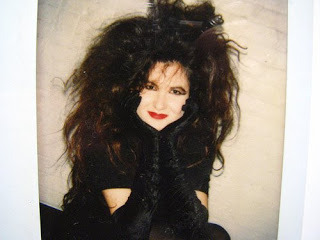
Tama Janowitz has always been great at first lines (Remember her Slaves of New York opened with this: “After I became a prostitute, I had to deal with penises of every imaginable shape and size.”) Her new novel, they is us, will be out in September in the U.S. (It’s already published in the UK by The Friday Project) and she strikes again with a first paragraph that seems to carry all our fears of a technologically mutated future and our present discontent with a changing world: “Years pass. There are still thimbles and Unitarians. The world is the same as it has always been, maybe a little worse. It’s a beautiful summer day, kind of, although violent electrical storms are predicted for later – if not that day, then sometime. And the news, too, is much the same: 40 percent of people can’t sleep; a type of bustard believed to be extinct has been found; war continues.” It’s an astonishing novel, its weird quirkiness a mask for a powerfully grounded nuts-and-bolts skewering of modern society. You may gather from Tama’s interview with me that she could’ve easily titled the book dystopia is tama. In fact, she unveils some astonishing points about how difficult it is simply to life a Writing Life.
Would you recommend any books on writing?
I always liked to read books on ‘how to write’; for some reason I found them very soothing and encouraging. I could not recommend one in particular, it was a long time ago but I did used to buy them. I think John Brain wrote one? I liked it.
What’s a typical writing day?
I used to be able to get up and get to work right away and I would give myself x number of words or pages to write. Every year it took me longer and longer and more and more procrastination on my part and fewer words. I find having a computer helps in some ways – you can change a character’s name just by typing ‘replace all’ but at the same time I keep checking my e-mail etc. and finding other things to do before settling down which nowadays is usually not until close to noon. I used to write seven days a week. Now I do not write on the weekends; I am like a huge slug or larvae, in bed and surrounded by small dogs (I have eight) and they want to go out but either it is too cold or too hot or it is raining or . . .
Plug your latest book. What’s it about? Why’s it so great?
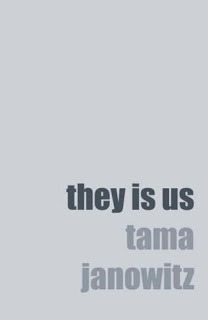
This book is called they is us. I like the pictures in it because I chose them. I like to color them in with soft color pencils. And I like to put some sticky mirrored paper on the front and back covers. You can buy this kind of paper on Canal Street in New York! They have all kinds of shiny paper in this store. I like the type that is silver with kind of holographic little squares. Also I like that it is a book with a front cover and a back cover and pages in between, that way I can look at it and think to myself, hey I wrote a book! And I got it published! Sometimes that makes me feel kind of good.
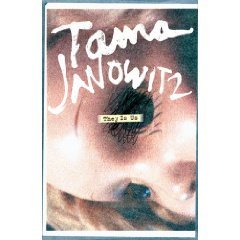
How much of what you do is:
a) formula dictated by the genre within which you write?
I would like to write a genre novel that would be popular but I don’t know how and it wouldn’t turn out right anyway or probably I would get bored and not finish it.
b) formula you developed yourself and stuck with?
I sure wish I had a formula and could stick with it. I don’t know what the formula would be.
c) as close to complete originality as it’s possible to get each time?
I don’t think it possible to be completely original and there is no such thing since we have to use things like ‘“oh no, you’re kidding!” he said.’ But I hope I can be a little bit fresh in my use of language or characters and style.
Who’s the greatest stylist currently writing?
There have been many great stylists and all different, Nabokov who could sling a sentence like a rope of rubies and strangle you with its brilliance. Or Virginia Wolff – the first to write as if really inside the person’s or people’s heads. But one kind of style does not negate another and as for today’s greatest stylist, I suppose there could be many, I do not keep up with or read that much current fiction.
Do you have a pain from childhood that compels you to write? If not, what does?
I do not know what compels me to write. I do not have a childhood pain or at least no more than anyone else. I do not like to write and I do not make any money off writing and I do not have any readers but a few and I have many nasty things written about my writing and I find writing depressing and boring but I keep writing and I do not know why.
What’s the best idea for marketing a book you can do yourself?
I really would not know. My first book American Dad did not sell any copies and when my next book Slaves of New York was published whenever they telephoned me from the publisher to say so and so wanted to interview me, I said, ok, because it had been so hard to sell my second book since my first book hadn’t sold and I kept writing books but nobody would publish them and so I switched to short stories because they took less time to write and get rejected but then the New Yorker started publishing me and then a company did want to publish a book of my short stories. So I always did what they asked me to do, they hired a company to make a short video of me and then I kept doing whatever they asked me to do. Then I did some advertisements. I was broke and I had only received three thousand five hundred dollars for that book. However then the press and people said I was out for publicity. And they said ‘a real writer would not do advertisements.’ There were editorials in the newspaper about my evilness. However nowadays not only are many writers making their own videos for Youtube to promote their books, over the many years before me authors who did commericals/adverts were: Fitzgerald, Faulkner, Steinbeck, Hemingway (whisky I think) Lillian Hellman; John Irving (am-ex); Norman Mailer (Trump Airline) and then after me Joan Didion did an ad (The Gap) and many others. Then a nasty little writer did an interview and called me a ‘whore’ for doing adverts. He said he had been asked to do adverts but he would not do so! Of course he had many many rich wives to support him, so I guess he didn’t need to!
What’s your experience with being translated?
I do not speak or read another language fluently enough to be able to tell how well or poorly a book of mine has been translated. Once someone began reading Kafka’s Metamorphosis in original German and I was stunned at the sound of the words and how much richer it sounded in German than English. I know that the couple who recently did a new translation of ‘Anna Karenina’ gave that book a whole new life and probably a lot of books have lost a lot in translation – people sometimes tell me ‘such-and-such’ a translation of one of my books was good or bad. It is hard for me to care however since in all these years I never got any royalty check beyond the original one or two thousand for initial rights of a book being sold. I figure what you get up front is all you are ever going to get; but since I do not take an advance but must write on my own first, I do not get any money – because publishers want to give you money based on an ‘idea’ but are always disappointed by what you end up writing. The only exceptions to this are a first time novelist who has already finished a book but does not have a track record – publishers will jump on this – or a book from the p.o.v. of a different culture – say, an Iraqi growing up in London or a Chinese person in Canada or . . . etc. etc. These books – let’s say, a girl from Jamaica writing about her family’s history and moving to the USA – are what get the Pulitzer and other prizes these days.
Do you live entirely off your writing? How many books did you write before could make a living at it?
I made a living from my writing for about three years. Before that I just kept at it and would get very tiny amounts here and there from small prize or small publication; then after I no longer made any money fortunately my husband did start to make money and he has been very, very kind and supportive emotionally and financially – I still have hopes that someday I might once again make a few dollars. For at this time had I spent the last 28 years working at McDonalds I would have earned more on a per annum basis.
How many books did you write before you were published?
I did write a few books before I got published as I had read that Doris Lessing wrote five books before she got ‘the first’ published. In my case though my first book American Dad did get published first in 1981, however, then some of the other earlier books I put into a drawer, I chopped up into stories
What’s the strangest thing that happened to you on a book tour?
Many things have happened but one thing that stands out is I was in Minneapolis and there were three people who came to hear me read/speak and there were many, many chairs set up and the staff disappeared and then the fourth person arrived and he resembled a murderer or serial killer and he sat in the front row and he had a metallic suitcase and I began to read and he opened his suitcase and I thought now he will take out a gun or knife. But instead he took out a book and began to read it. But it was not my book and he was not reading along to himself with what I was reading. It was a completely different book by a different person.
Another time I had a publicist from the company who sent me out on a ‘book tour’ only she did not book me in any media or readings and so I went from city to city picked up by an escort and then sat in the hotel; sometimes the escort would wonder why the publicist had not booked me on various tv shows/interviews etc that would have been happy to have had me. When I mentioned to the publicist that I wasn’t doing anything but sitting in my hotel she began to scream at me at the top of her lungs that it was all my fault.
What’s your weirdest idea for a book you’ll never get to publish?
I do not have weird ideas, I have regular ideas but they don’t come out normal.
Gimme a Break Dept. #89: He looked like a movie star!
Earlier this week I noted that I dislike writers describing a character as looking like a particular movie star. I cited a few examples from Elmore Leonard (which touched some nerves among fans of the Great Detroit Coolster) and one from Dan Brown. Now I bring you a real corker from The New Yorker.
The magazine's latest issue (at least the latest one to get through the Israeli postal system to me) contains a complacent little profile of Nora Ephron. In it, the writer quotes Ephron's sister as saying that their father "might as well have been Ben Bradlee." He then goes on to explain: "To understand this, all you really need to know about Bradlee, who was the executive editor of the Washington Post during the Watergate era, is that Jason Robards played him in 'All the President's Men,' and that it was very good casting."
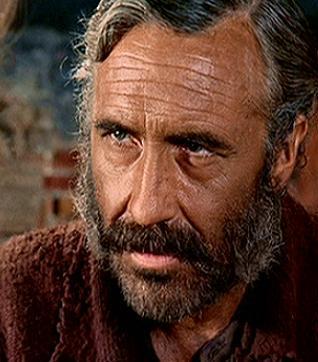
Really? That's all I need to know? Brought down the President of the US--doesn't ring a bell. Looked like a moderately famous movie actor--oh, right him!
Maybe I was harsh on Elmore. I criticized him for writing (in two separate stories) that a character looked like Jack Nicholson. Not good, but at least I have a picture of Jack and the character he plays (again and again). Jason Robards? Do we all have a picture of him?
You see, I think of him as the bandit in "Once Upon a Time in the West." Was Ben Bradlee like that?
Or maybe what the New Yorker writer meant was: "Ben Bradlee was like Jason Robards when he was playing Ben Bradlee and not anyone else." Which makes about as much sense as describing him the way he did.
The magazine's latest issue (at least the latest one to get through the Israeli postal system to me) contains a complacent little profile of Nora Ephron. In it, the writer quotes Ephron's sister as saying that their father "might as well have been Ben Bradlee." He then goes on to explain: "To understand this, all you really need to know about Bradlee, who was the executive editor of the Washington Post during the Watergate era, is that Jason Robards played him in 'All the President's Men,' and that it was very good casting."

Really? That's all I need to know? Brought down the President of the US--doesn't ring a bell. Looked like a moderately famous movie actor--oh, right him!
Maybe I was harsh on Elmore. I criticized him for writing (in two separate stories) that a character looked like Jack Nicholson. Not good, but at least I have a picture of Jack and the character he plays (again and again). Jason Robards? Do we all have a picture of him?
You see, I think of him as the bandit in "Once Upon a Time in the West." Was Ben Bradlee like that?
Or maybe what the New Yorker writer meant was: "Ben Bradlee was like Jason Robards when he was playing Ben Bradlee and not anyone else." Which makes about as much sense as describing him the way he did.
Ellroy Queen: Megan Abbott’s Writing Life

Megan Abbott is the female James Ellroy. When I read her Edgar-award-winning “Queenpin,” I immediately was put in mind of everyone’s favorite noirmeister. Dig it. Even more I loved “The Song is You,” in which Abbott took a real-life missing persons case from 1949 and plumbed her Hollywood characters for real debauchery and dirt like Ellroy at his best. Dr. Abbott (she has a Ph.D. in English and American Literature from New York University) has a great new one that’s a US Independent Booksellers pick for August. As for how she does it, read on, checking out her particularly intriguing writing exercise. As someone might write: Off the record, on the Q.T., and very hush, hush.
How long did it take you to get published?
I wrote for years without finishing anything or knowing what to do with it. Once I finished a novel, it took about a year or so to get an agent and sell it. I was both stupid and lucky. Stupid because I had no idea how hard it would be, and lucky because I found an agent and an editor willing to take a chance.
Would you recommend any books on writing?
I’m sure there are good ones, but, for me, reading novels all the time is much more helpful. I once had a teacher who had us do this exercise I always remember because I use it to this day. He had us pick a favorite passage by an author and rewrite the passage by replacing every word. A noun for a noun, a verb for a verb, and so forth. I took a passage from F. Scott Fitzgerald. It was staggering how much it forced my writing out of an old rhythm and into a new one. I did it a lot with Raymond Chandler novels once I discovered them. It breaks you out of ruts and you pick up this range of cadences
What’s a typical writing day?
I start about eight in the morning and then waste many, many hours—much time lost on thesaurus.com, on following endless research trails—I collect a lot of things: old menus from the 1920s, photos of friars’ roasts from the turn of the century, abandoned diaries. I get lost in them and it can, easily, take me four hours to produce a page, and when I do, it’s usually in a mad rush inspired by guilt for all that procrastinating.
Plug your latest book. What’s it about? Why’s it so great?
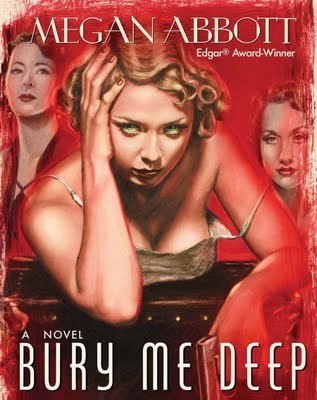
It’s a strange little tabloid tale loosely based on a famous real-life crime from the 1930s—the Winnie Ruth Judd “Trunk Murderess” case. It’s called Bury Me Deep and it follows Marion Seeley, a young woman left by her husband in Phoenix at the height of the Great Depression. Very naïve, very lonely, she falls in with two of the town’s single gals, gals with reputations: Soon enough, she’s swept up in their freewheeling lifestyle, the “thrill parties” they throw. At one of these parties, she meets and falls hard for charming Joe Lanigan, a rising town leader who proves her downfall.
How much of what you do is:
a) formula dictated by the genre within which you write?
b) formula you developed yourself and stuck with?
c) as close to complete originality as it’s possible to get each time?
I am a genre lover—so much so that I like to knock them together. For Bury Me Deep, for instance, the idea was to merge a very traditional melodrama—a woman who faces this almost Edith-Wharton-style dilemma (follow society’s rules or one’s own heart) with a down-and-dirty pulp story of drugs, sin and murder. I think it’s probably true in all my novels—with the possible exception of Queenpin, which I tried to make as close as possible to classic pulp fiction. I think all genres are in many ways one genre, with different accessories. In the end, we’re all fighting social rules, society itself, or all fighting ourselves—which is kind of the same thing.
What’s your favorite sentence in all literature, and why?
Did you ever have a sister, from Faulker’s The Sound and the Fury. In a book swollen with words, twisting and curling on themselves, pounding and thundering—it can still be gathered into in that simple line. And, when that line comes—which it does, more than once—it’s a heartbreaker.
What’s the best descriptive image in all literature?
Humbert Humbert describing Lolita’s feet, or Raymond Chandler describing almost anything.
Who’s the greatest stylist currently writing?
Daniel Woodrell.
Who’s the greatest plotter currently writing?
I guess I don’t really read for plot. In fact, many of my favorite books have rambling, meandering plots.
How much research is involved in each of your books?
For the historical ones—set in the 1930s-60s—a lot, but not in any coordinated way. For Bury Me Deep, I read a lot about TB hospitals and morphine addiction. Then, after a few months, I stop researching and start writing—it’s hardest for me to both at the same time.
Where’d you get the idea for your main character?
She’s modeled on her real-life counterpart, Winnie Ruth Judd, but Marion ends up veering pretty wildly. There was only so much I could find out about what went on in Winnie Ruth’s head, so I ended up making up the rest and soon enough Marion was all her own.
Do you have a pain from childhood that compels you to write? If not, what does?
Only boredom. I had a wonderful childhood with great, creative parents and brother, but it was old-school suburbia and I wasn’t imaginative enough to find the magic in it. I felt like I was just killing time.
What’s the best idea for marketing a book you can do yourself?
Golly, I have no idea. You tell me.
What’s your experience with being translated?
It’s fun to see the editions and see if/how they package it differently. I have no idea if those pages correspond to what I wrote, which is kind of a neat feeling.
Do you live entirely off your writing? How many books did you write before could make a living at it?
No. I work at a nonprofit four days a week and it keeps me honest and “in the world.” I have trouble being at home all day, living in my head. I think that requires a mental strength I don’t have.
How many books did you write before you were published?
No finished ones. But dozens of false starts and embarrassments.
What’s the strangest thing that happened to you on a book tour?
I arrived in Scottsdale, Arizona with Vicki Hendricks, famous for her wonderful and very sexually explicit noir novels. It was over 100 degrees and we had a little time before our signing so we strolled into a nearby, nearly empty bar for a soda. Within ten minutes, a very drunk young man at the bar (it was only noon) kept talking to us and he confessed he was going to jail the following day. Then, he pulled down his pants to show us the tattoo on his bare bottom—the one he was sure was going to doom him in jail. It was a big beating heart and, of course, it said, “Mom.”
What’s your weirdest idea for a book you’ll never get to publish?
I never think any of my book ideas will lead to publication!
Published on August 25, 2009 07:53
•
Tags:
chandler, crime, ellroy, fiction, film, hardboiled, interviews, james, life, literature, new, raymond, writing, york
THE FOURTH ASSASSIN on video
To introduce the next of my Palestinian crime novels, THE FOURTH ASSASSIN, my friend videographer David Blumenfeld filmed in New York (where the book takes place). His montages are mainly from Brooklyn's Bay Ridge and Coney Island sections. He then recorded me, looking sweaty and frankly a bit doped up, in my favorite seedy cafe in Jerusalem's Muslim Quarter.
You can view it here, and if you prefer you can watch it in French, German, or Italian. THE FOURTH ASSASSIN will be published in the UK and US in February, but I just couldn't keep my video a secret until then.
You can view it here, and if you prefer you can watch it in French, German, or Italian. THE FOURTH ASSASSIN will be published in the UK and US in February, but I just couldn't keep my video a secret until then.
My Manchurian Candidate

One of my biggest boosters has been Bill Ott, reviewer for the pre-publication review Booklist. Here's his review of my forthcoming THE FOURTH ASSASSIN, which is out in the US and the UK on Feb. 1:
"Road-trips in crime series have the built-in problem of removing their heroes from the landscapes that define them. Rees’ Bethlehem history teacher and occasional sleuth Omar Yussef is a strong enough character to survive a temporary transplant to New York, but that’s not to say we don’t miss the vividly evoked Palestine setting. Yussef has agreed to attend a UN conference in Manhattan because it will give him a chance to see his son Ala who is living in Brooklyn’s Little Palestine neighborhood. The reunion is spoiled, however, when Yussef finds one of Ala’s roommates dead, the victim of what appears to be a ritual killing. With Ala a suspect, Yussef attempts to find the killer. Could the history lessons that Yussef once taught Ala and his friends have been corrupted into a contemporary suicide-assassination plot? Although the setting and the high-concept thriller plot—the finale evokes The Manchurian Candidate—take us too far away from the small human dramas that usually drive this series, Yussef himself never loses sight of what he calls the life that remains when politics is sluiced away like the filth a stray dog leaves in the street."
I like what Bill sees in the novel--and its predecessors--because I've tried to make Omar Yussef a detective who confronts small aspects of the violence around him, rather than writing the kind of thriller where one guy saves the world. That wouldn't reflect the Palestinian reality.
I moved a little further from that smallness of conflict and locality with this new book. Here's why: while a "road trip" can detract from some detectives, it's in the nature of the Palestinian reality to be taken far from home. Most Palestinians, after all, live outside "Palestine." Omar Yussef is lonely and alien in New York, outside his usual milieu. Encapsulating that diaspora is one of the things about which I'm most pleased when it comes to THE FOURTH ASSASSIN.



